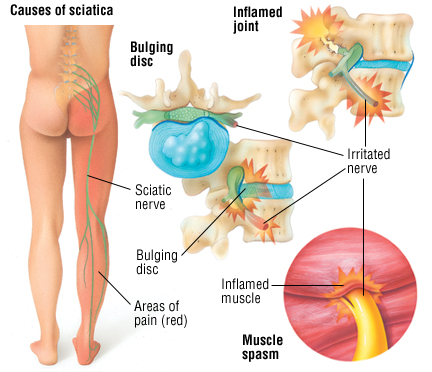Sciatica Pain Frisco TX
Sciatica is a condition that results from pain or injury to the sciatic nerve. Although it is not a disease in and of itself, it is a condition that results from other problems within the body and can lead to symptoms such as numbness, weakness, tingling and pain in the leg.
The problem that is known as sciatica occurs when pressure or damage takes place to the sciatic nerve. This is the nerve that begins in the lower spine and travels down the back of each leg. This nerve is important for controlling the lower leg and the back of the knee. It also provides the sensations that you feel in the back of your thigh and in the sole of your foot.
Common sciatic causes
Although there are many different problems which could lead to a difficulty with sciatica, some of the most common reasons why it occurs are spinal stenosis and a slipped disc.
Sciatica symptoms

The symptoms that you experience may vary quite widely from what somebody else with the same condition feels. For the most part, however, it can result in a dull aching or mild tingling in the area. For some individuals, it also feels as if the area is burning. In more extreme cases, the pain may be severe enough that it limits the ability of the person to move.
In most individuals, sciatica occurs on one side of the body. This may be felt as a sharp pain in the hip or in one part of the leg as well as numbness in other parts of the leg. The pain or numbness may also travel to the calf or even down to the sole of your foot, resulting in a weak feeling throughout the leg. This pain often starts slowly but gets worse over the course of time or if you have been sitting for long periods of time, at night, if you are laughing, sneezing or coughing or if you are walking for an extended amount of time.
When to contact your healthcare provider
You should contact your healthcare provider immediately if you have any of the following problems.
- Back Pain with an Unexplained Fever
- Back Pain after You Have Fallen or Been Struck
- Swelling or Redness in the Area of the Spine
- Pain Travels down Your Legs under the Knee
- Numbness or Weakness in the Leg, Thigh, Pelvis or Buttocks
- Blood or Pain When You Urinate
- Pain That Intensifies As You Are Lying down or If It Wakes You up from a Sound Sleep
- An Inability to Get Comfortable Because of Severe Pain
- Urinary Incontinence
Your doctor should also be informed if…
- You Use Intravenous Drugs or Steroids
- Unexplained Weight Loss
- Changes in the Lower Back Pain That You Experience
- Any Back Pain That Lasts Longer Than Four Weeks
- As with many back problems, preventing the discomfort when you have nerve damage is an important step in the process. If you avoid lying down for prolonged amounts of time or sitting with pressure on the buttocks for an extended amount of time, you may be able to prevent some of the discomfort.
